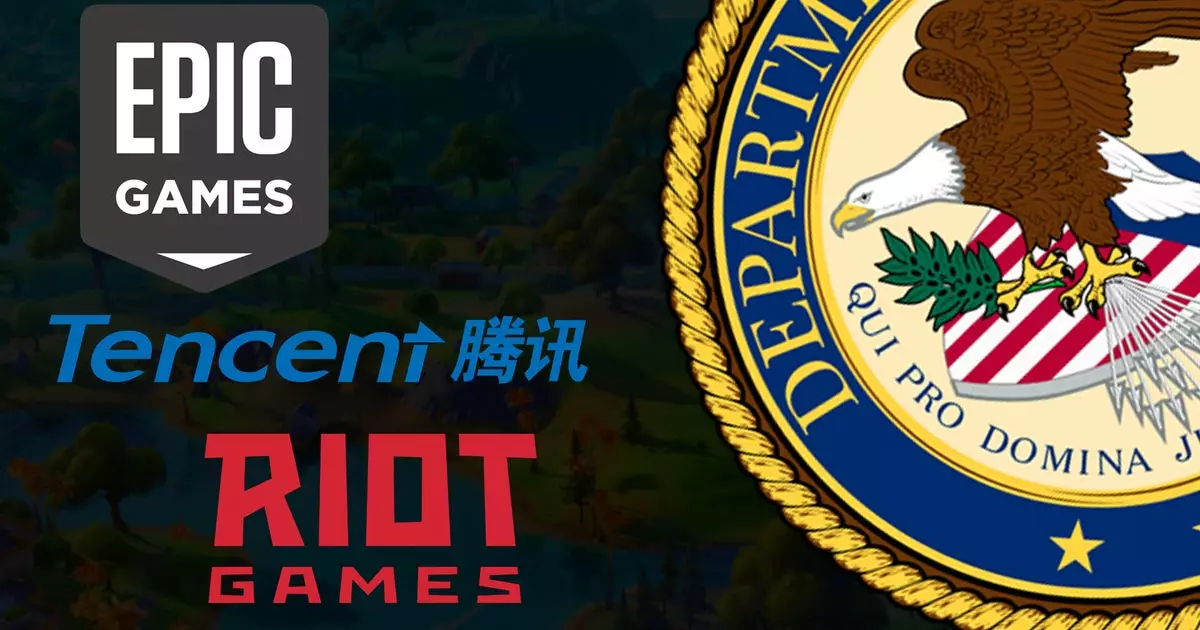The recent resignation of two directors from the board of Epic Games sheds light on the complex interplay between corporate governance, competition laws, and the expansive influence of major players in the video game industry. This incident, sparked by an investigation from the U.S. Department of Justice (DoJ), raises pertinent questions about the compatibility of shareholders in competing companies serving on the same board and the potential implications for ownership structures within the gaming world.
Ben Feder and David Wallerstein, both previously affiliated with Tencent, have stepped down from their roles at Epic Games amid scrutiny concerning possible violations of antitrust regulations. Tencent, a dominant entity in the gaming sector with substantial stakes in various game publishing and development companies—including complete ownership of Riot Games—found itself in a precarious position as a result of these conflicts of interest. Feder served as President of International Partnerships at Tencent while also holding a past leadership role at Take-Two Interactive, another well-known gaming publisher. Wallerstein, previously a senior executive at Tencent, has also acted as a senior advisor. Their previous and existing roles raised alarms about potential boardroom influence over Epic Games, which operates as a competitor and may not benefit from shared leadership oversight with rival entities.
The core of this controversy revolves around the Clayton Act, a key piece of legislation designed to prevent anti-competitive practices that could arise from board members serving on competing corporate boards. This law specifically prohibits individuals from simultaneously holding director positions in companies that might present conflicting interests or competitive challenges. The DoJ’s investigation and subsequent resignations highlight the critical importance of maintaining fair competition in a market where a few players dominate.
This legal backdrop illustrates why these resignations were not merely corporate formalities but rather a necessity for adherence to regulatory norms. The fact that these moves were initiated by the government’s inquiry underscores the active role regulators play in monitoring corporate practices to maintain an equitable marketplace.
The fallout from the investigation forces both Tencent and Epic Games to re-assess their corporate governance structures. In a bid to alleviate concerns regarding potential overreach and backdoor negotiations, Tencent has agreed to amend its shareholder agreement, ensuring that it can no longer appoint directors to Epic’s board in future interactions. This move reflects a significant shift toward higher transparency and adherence to competitive standards within the industry, with companies recognizing the prevailing regulatory scrutiny and the potential ramifications of non-compliance.
While the prospect of losing board members might seem daunting to an expanding entity like Epic Games, the situation also presents an opportunity for a renewed commitment to ethical governance. By distancing itself from potentially conflicting interests, Epic can promote a clearer focus on innovation and consumer-centric practices free from the constraints of external influence tied to rival corporations.
This incident is illustrative of broader trends and tensions within the gaming industry. As corporations grow and acquire various stakeholders, the potential for conflicts of interest escalates, prompting regulatory bodies to take a firmer stance to curb monopolistic behavior. Companies like Microsoft have faced similar scrutiny in their acquisition ventures, which revealed a pattern of large tech firms grappling with antitrust allegations as they expand their footprint through acquisitions.
The implications of this investigation extend beyond Epic Games and Tencent; they reflect a natural evolution in how authorities regulate competitive environments in high-stakes industries. It serves as a reminder for all corporations to maintain rigorous compliance with established laws to sustain healthy competition.
The resignation of Ben Feder and David Wallerstein from the board of Epic Games signals a pivotal moment in corporate governance and compliance with antitrust laws. The proactive adjustments derived from this investigation highlight the desire for fair competition in an industry that thrives on innovation and competition. For both Epic Games and Tencent, this incident can serve as an impetus for enhanced ethical conduct and operational transparency, safeguarding their reputations in the fast-paced world of video gaming where market dynamics are constantly in flux.

